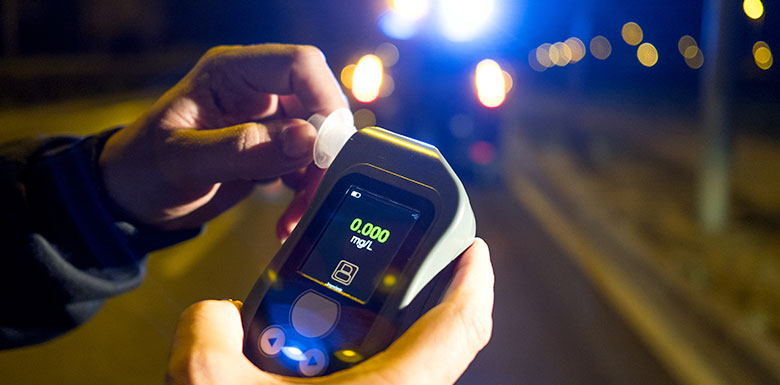7 Ways a Breathalyzer Can Be Wrong

If the Tampa police pulled you over for drunk driving, they probably asked a few questions. They wanted to see how you’d react, what you’d say, and whether you’d slur your speech. If the cops weren’t confident you were sober, they probably pulled out a small breath test device or a breathalyzer.
If you blow into a breathalyzer and it shows alcohol in your body, don’t panic. These machines aren’t as trustworthy as the police and prosecutors would have you believe. A lot can go wrong with these devices, making the results inaccurate and unreliable for court.
But fighting breath test results regarding a Tampa DUI takes knowledge and skill. You can’t expect to do it yourself. Instead, call an experienced Tampa DUI lawyer at (813) 258-4800, or use the online form to schedule a free consultation.
Different Types of Breath Tests
There are roadside breath tests, and there are breath tests you take after your arrest. Cops use small, handheld devices during traffic stops. They can be inexpensive and easy to maintain, which is why police like them. The results, however, are inconsistent and inaccurate. That’s why most states don’t let prosecutors use these results in court. A roadside breath test gives officers information they can use to arrest you instead of evidence.
You’ll submit to a breath test at the police station on a machine that isn’t portable or cheap. These machines cost tens of thousands of dollars and should be well-maintained and calibrated. That’s because prosecutors can use the results in court.
Things can go wrong with both types of breath machines, though. It’s essential to get a Tampa DUI lawyer who can review the machine’s condition and maintenance records. Brett also reviews who gave you the test and the procedures they followed.
Ways Breath Test Machines Can Be Wrong
1. Improper Calibration
Breathalyzers are precise machines that have to be calibrated throughout their life. What is calibration? It’s using the device under specific, known circumstances to see if it gives the right results. It isn’t an easy process, but it’s essential.
Over time, these machines stop working how they’re supposed to, and calibration fixes that. When the cops don’t calibrate the device, the results can wrongly indicate a higher blood alcohol level or BAC.
An experienced DUI defense lawyer finds which machine the police department used, the manufacturer’s calibration recommendations, and the department’s maintenance records.
2. Incorrect Chemical Solutions
Breath test devices use chemical solutions. They need to have the right ingredients in the right amounts and be free from contamination. Police departments sometimes used old, expired solutions. Or worse yet, homemade solutions. Anything off about the solution can result in inaccurate results.
3. Inappropriate Modifications
A concerning issue is when police departments troubleshoot problems with their breath test machines. When the device isn’t working correctly, they develop homemade solutions instead of inspecting it and having it repaired.
For example, some machines have a sensor to detect breath temperature and factor that into the results. Some police departments turn that sensor off if the device isn’t working. Unapproved modifications can cause several inaccuracies.
4. Faulty Programming
These devices have hardware and software, and both are essential. Software mistakes can cause inaccurate results. Finding programming errors is incredibly difficult. That’s because manufacturers of breath test machines don’t sell them to the public.
Defense attorneys can’t usually get ahold of the device and hire an expert to examine the programming, but this issue is becoming more widely known.
5. Improper Methodology
Police departments should have procedures on how to use breath test machines. They should include when and how the device is calibrated and how to use it for suspected DUIs. These rules create a methodology that lets the police, prosecutors, and judges have confidence in the results. Without consistent methods, there’s no way to prove the machine was calibrated and used correctly. The results are more likely to be wrong.
6. Pre-Existing Conditions
One reason a breathalyzer can be wrong is a pre-existing medical condition. If you suffer from certain conditions, like diabetes or persistent acid reflux, the results won’t be accurate. The machine will think you have a higher BAC than you do.
7. Possible Chemical Exposure
Other chemicals, like paints, varnishes, paint remover, gasoline, cleaning products, or mouthwash, can throw off a breathalyzer. Depending on your job or what was in your car, fumes from these chemicals could make the device show you have a BAC when you’re sober.
Call a Lawyer for Help After a Breathalyzer
If you’re confident a breathalyzer’s results were wrong, call Tampa criminal lawyer Brett Metcalf. He has years of experience defending against Florida DUI charges involving faulty breath test results and knows all the ways these machines can be wrong. He isn’t afraid to go after evidence or hold the police accountable for a mistake.
Brett will want to know what device was used, it’s calibration and maintenance history, department methodology, and more. He scrutinizes the machine’s condition, whether the police calibrated it, and whether any other issue could’ve caused a false positive or higher BAC. When he finds errors, it can limit the evidence in your DUI case and possibly lead to a reduction or total dismissal.
Give Metcalf Falls, Criminal Defense Attorneys, P.A., a call at (813) 258-4800 or use the online form to schedule a free consultation.
